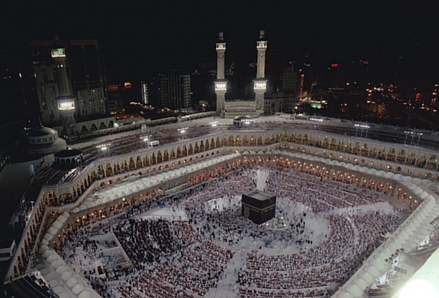Travelling for Hajj
A pilgrimage to Mecca for Hajj is one of the 5 pillars of Islam. Over 2 million Muslims from all over the world performed Hajj in 2015, making it one of the largest mass travel events in the world.
Pilgrims performing Hajj will be travelling for a relatively long time in crowded places (travel agents offer packages lasting about 3 weeks). The crowds create an environment where illnesses can quickly pass from person to person. This raises some unique health risks, in addition to special vaccination requirements which only apply to pilgrims during the Hajj season.
Specific health issues
Meningococcal Meningitis, Polio, and Yellow Fever
All Hajj pilgrims to Mecca must show proof of vaccination against Meningococcal Meningitis (quadrivalent ACYW135) upon arrival, issued not more than 3 years and not less than 10 days before the date of arrival. This also applies to Umrah visitors over 2 years of age any time during the year.
Proof of vaccination is legally required to enter the country and as part of your visa application. Your travel agent may assist you with finding a health practitioner to administer the vaccination. Travellers arriving from countries in the African Meningitis Belt will be given meningococcal prevention medication. (See Meningococcal Meningitis for a list of countries in the Meningitis Belt.)
Note that non-pilgrim travellers may also be asked to show proof of vaccination during the yearly pilgrimage season. If you do not have a certificate of vaccination, you may be vaccinated upon arrival.
In addition, depending on which country you are travelling from, proof of vaccination against Polio and Yellow Fever may be required for both adults and children. See the required vaccinations for Saudi Arabia for details.
Influenza
The flu vaccine is recommended for all Hajj pilgrims. The crowds during pilgrimage season are a perfect environment for influenza to spread. The flu vaccine can help protect you from serious illness if you are exposed to the virus and prevent you from passing it on to others. Ask your health practitioner if the flu vaccine is currently available in your area. (The vaccine is available seasonally.)
Heat and sun
The temperatures across Saudi Arabia are typically well above 30°C / 86°F in August and September, when the 2017 Hajj will take place. If you can, try to stay out of the sun during the middle of the day when the sun is strongest. Use sunscreen and remember to re-apply it every few hours (following the manufacturer’s directions). Wearing loose, light-weight, long-sleeved clothing can also help keep you cool. Take breaks in an air conditioned area to cool down. Don’t forget to stay hydrated, especially when you are following a busy schedule with your travel group.
Fitness
Performing Hajj is very physically demanding. Your trip will include lots of walking and standing during the heat of the day. Start training several months before departure to make sure that you are physically fit enough for all aspects of the trip.
Planning a healthy Hajj
2 months or more before travel
- Plan far in advance for any special needs, including mobility devices.
- Book an appointment with your health provider or travel clinic for all required and recommended vaccinations. This is also a good time to ensure that all your Routine Immunizations are up-to-date.
6 weeks before travel
- See your health provider 6 weeks before you leave to make sure your health needs are covered. Finish getting any recommended vaccines such as Hepatitis A, Hepatitis B, and Typhoid.
- Ask your tour provider for a list of local doctors. Your travel package may also include insurance. If it doesn’t, consider purchasing travel medical coverage in case of an emergency. Read the fine print to ensure that you are covered for your current health needs.
- Refill any prescription medication (get enough to last your trip). Get a copy of your prescription and a letter from your doctor outlining your medical condition and treatment plan. This will help facilitate medical care in Saudi Arabia in case you run out of your medication or it gets lost.
1-2 weeks before you go
- Assemble your travel health kit, including any prescription medications and first aid supplies such as band-aids, antihistamines, and analgesics.
- Keep your proof of vaccination with your passport.
During your pilgrimage
- Be conscious of what you eat and drink. Drink bottled water from reputable brands, boil it before drinking, or choose a hot beverage like tea or coffee. Eat foods that are freshly cooked and steaming hot. Avoid buffet dishes that have been standing out for a long time. If your travel package is high-end, your accommodations may serve disinfected water and reliable food.
- Wash your hands frequently and thoroughly with soap and water to prevent the spread of infections. Always wash your hands before eating.
After your trip
- See your health practitioner right away if you have diarrhea, a fever, or other flu-like symptoms after you return from your trip. Don’t forget to mention that you were travelling.
A note on MERS
Middle East Respiratory Syndrome Coronavirus (MERS-CoV) is a severe respiratory infection. Cases have been confirmed in Saudi Arabia in 2017.
The risk to travellers is low. Avoid contact with camels and visits to farms or camel markets. Wash your hands thoroughly and frequently, don’t touch your face, and avoid contact with people who are coughing or sneezing. Avoid sharing prayer mats. Seek medical attention immediately if you develop symptoms of MERS (which include fever, cough, shortness of breath and difficulty breathing).
By Daphne Hendsbee. Updated July 11, 2017.
Photo by FreeImages.com/G.M Farooq.



